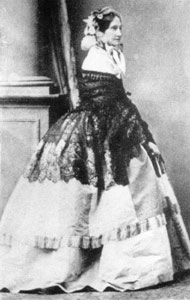CyrilVladisla
Imperial Majesty
- Joined
- Dec 2, 2013
- Messages
- 12,090
- City
- Conneaut
- Country
- United States
That is correct.
A very fancy painting. Perhaps it took Winterhalter a long time to paint.

The Empress was very much ultramontain. After her exile to England she remained devoted to the Church of Rome. I thoroughly recommend a visit to Farnborough Abbey, where Napoleon III, Eugenie, and the Prince Imperial are entombed, to get a sense of her devotion. I went there one afternoon, a bit of a spur of the moment trip on my last day in London. I got there late in the afternoon, and proceeded to get lost. After asking direction at a local pub, I was back on track. On the front gates were imperial eagle shields. But, unfortunately, the church was closed and locked, and there were no signs of life anywhere. So I went to the front door of the monastery and rang the bell. The door opened and a monk said hello. I asked him if it was possible to see inside the church.
"Are you local" he asked
"No, not really"
"Where have you come from?"
"Australia"
"Where in Australia?"
"Melbourne"
"Where in Melbourne"
"St Kilda"
"Almost next door, I'm from Malvern"
it turned out we knew a few of the same people. He very kindly got the keys and took me for a private tour of the church and the Imperial Crypt. He had lots of interesting stories, and I asked about Princess Napoleon. He said she is a very kind and generous lady; is a regular visitor and takes a very maternal interest in all the monks, who she considers part of the family. It was a fascinating afternoon. As I left I passed a monk chopping away at some overgrown trees. Later, after looking at the abbey's website, I discovered he was the Abbot.
Empress Eugénie
Maria Eugénia Ignacia Augustina Palafox de Guzmán Portocarrero y Kirkpatrick, 9th Countess de Teba, aka Eugénia de Montijo (May 5, 1826 - July 1920) was Empress of France (1853-1871).
- Empress Eugénie -
The future and last Empress of France was born in Granada, Spain to Don Cipriano Palafox de Guzmán y Portocarrero, Count de Teba, Count de Montijo, and his half-Scottish, half-Spanish wife, Maria Manuela Kirkpatrick, a daughter of the Scots-born William Kirkpatrick, a naturalized American citizen who became U. S. Consul to Malaga and later operated a wine bar. Her sister, Maria Francisca de Sales, aka Paca, inherited the Montijo title as well as other subsidiary family titles, married the duke of Alba, and died in 1860. According to some sources, Don Cipriano was not the father of his daughters, and rumor had it that Eugenia's father was actually a British diplomat, George William Frederick Villiers (1800-1870), later 4th Earl of Clarendon, who gained fame as British Foreign Secretary.
The Countess de Teba, as Eugénia/Eugénie was known before her marriage, wed Emperor Napoleon III on January 30, 1853, not long after he had been rebuffed in his eager attempts to marry Queen Victoria's teenage niece Princess Adelaide von Hohenlohe-Langenburg. The Teba/Bonaparte union was not a match looked upon with complete delight. According to an article in The Times, "We learn with some amusement that this romantic event in the annals of the French Empire has called forth the strongest opposition, and provoked the utmost irritation. The Imperial family, the Council of Ministers, and even the lower coteries of the palace or its purlieus, all affect to regard this marriage as an amazing humiliation ...." Apparently, a 26-year-old Spanish countess was not considered nearly good enough for a Bonaparte (in any case, evidence suggests that the emperor was probably not even a blood Bonaparte, but the result of one of his mother's extramarital affairs).
As she was educated and very intelligent, Eugénie's husband usually consulted her on important questions, and she acted as Regent during his absences. When the Second Empire was overthrown after France's defeat in the Franco-Prussian War (1870-71), the empress and her husband took refuge in England, where she continued to live after his death in 1873.
The former empress died in July 1920 at the age of 94, during a visit to her native Spain, and she is interred in the Imperial Crypt at Saint Michael's Abbey, Farnborough, Hampshire, England, with her husband and her son, the Prince Imperial, who died in 1879 in Africa during battle with Zulu warriors.
Her deposed family's association with England was commemorated when the second daughter of the present Duke of York was named Princess Eugenie.
It was Prss Beatrice, the youngest of Queen Victoria’s daughters, who was rumoured to be fond of Prince Napoleon. She married Prince Henry of Battenberg. It was Vicky who married the future Kaiser Friedrich, long before, I think from memory it was 1857.

